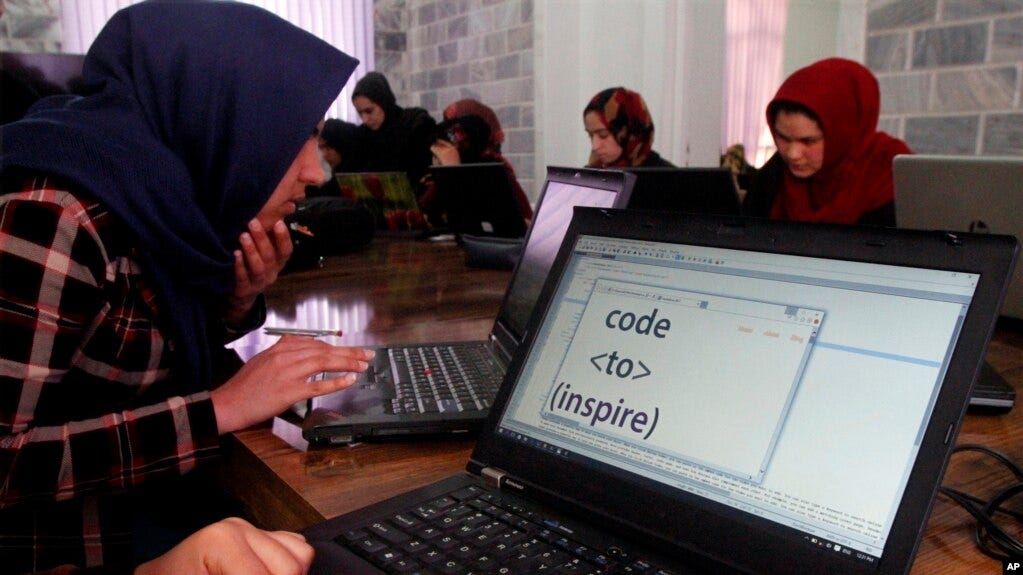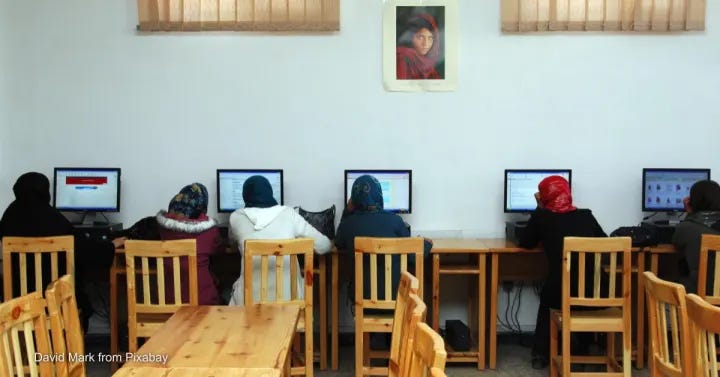Afghan Women Are Still Learning To Code
As the Taliban clamps down on female freedoms, Kick-Start is creating new career paths for women behind closed doors.
For Sohaila*, the beauty of coding is the “perfect blend of creativity and logic it offers.” Well-written code can build businesses, solve complex problems and bring ideas to life, a promise she finds “immensely satisfying” as she pursues a career in the field. This wasn’t her original plan, but when the Taliban forced her to abandon her studies at university, she found a new way to pursue her goals.
“The Taliban takeover had a profound impact on my plans for the future… It necessitated a careful evaluation and adjustment of my goals, considering alternative paths, exploring different opportunities, and focusing on areas that were more feasible and aligned with the current situation,” she says.

Life in Afghanistan has changed beyond recognition for young women like Sohaila, who have been forced to confront a very different future since the Taliban seized power in 2021. Banned from secondary education, universities and most forms of employment, their options are severely curtailed, forcing many to reassess their goals and forge a different future.
For Sohaila, this meant enrolling in a new software development course run by Kick-Start, an organization providing free tech boot camps to Afghan women. The skills she gained secured her a place with the well-known coding bootcamp Microverse, opening up a range of online job opportunities in web development and related fields. “I am developing new plans for my future - adapting to the changing landscape, exploring alternative career paths and pursuing opportunities that are better suited to the current situation,” she says.
This is the aim behind the Kick-Start program, which recently embarked on a second round of boot camp sessions funded by an Ideas Beyond Borders Innovation Hub grant. “Everyone deserves access to education and career opportunities in software development. Our "Kick-Start to Software Development" program is dedicated to breaking down cultural and financial barriers to education and career opportunities in tech for Afghan women,” says Ahmad Yousufi, who co-founded Kick-Start alongside Najla Ahmadyar.
The program begins with a three-month development course that covers responsive web design, JavaScript, data structures & algorithms, Git & Github, and the principles of writing clean code. The curriculum follows freeCodeCamp and prepares students to join global coding schools like Microverse and Code Institute.
“These schools have been selected because they have a proven track record of success in training and placing graduates in software development jobs, and they offer high-quality, remote-based education that is accessible to individuals from all over the world, including those living in Afghanistan,” Yousufi adds.

Several Kick-Start graduates have gone on to obtain a place at these schools and secure job opportunities with international organizations. For many, it has alleviated the despair they felt as the Taliban rolled back women’s rights in the months after taking power. *Yalda, 24, was among those forced to abandon her studies when the Taliban issued an edict in December 2022 banning all Afghan women from attending university.
“I was very disappointed when I missed the opportunity to learn. Joining this course made me hope for my future again and allowed me to learn in a new direction.” Since joining Kick-Start, she has decided to become a full-stack developer. “I want to work on real-world projects and use programming to provide solutions to societal challenges and problems,” she says.
*Zahra, 23, also has plans to become a full-stack developer. She was already learning coding at university before she was forced to leave and joined the Kick-Start program to continue enhancing her skillset. “What I like most about studying tech and coding is the constant learning and problem-solving aspect. It's incredibly satisfying to build functional applications and see how coding can bring ideas to life. Additionally, the dynamic nature of the field ensures that there's always something new to discover and explore.”
While life in Afghanistan has changed and she can no longer pursue the future she imagined, Zahra believes she can find ways to adapt and continue developing the skills to succeed in her field. “I have new plans for my future now. Firstly, I am actively seeking job opportunities in the computer science field, particularly as a developer, to gain practical experience and contribute to meaningful projects. Then, I intend to pursue further education in the field of AI, as it aligns with my interests and offers promising prospects.”
*Pseudonyms have been used for several individuals featured in this story to protect their identity. This article was written by Olivia Cuthbert.


